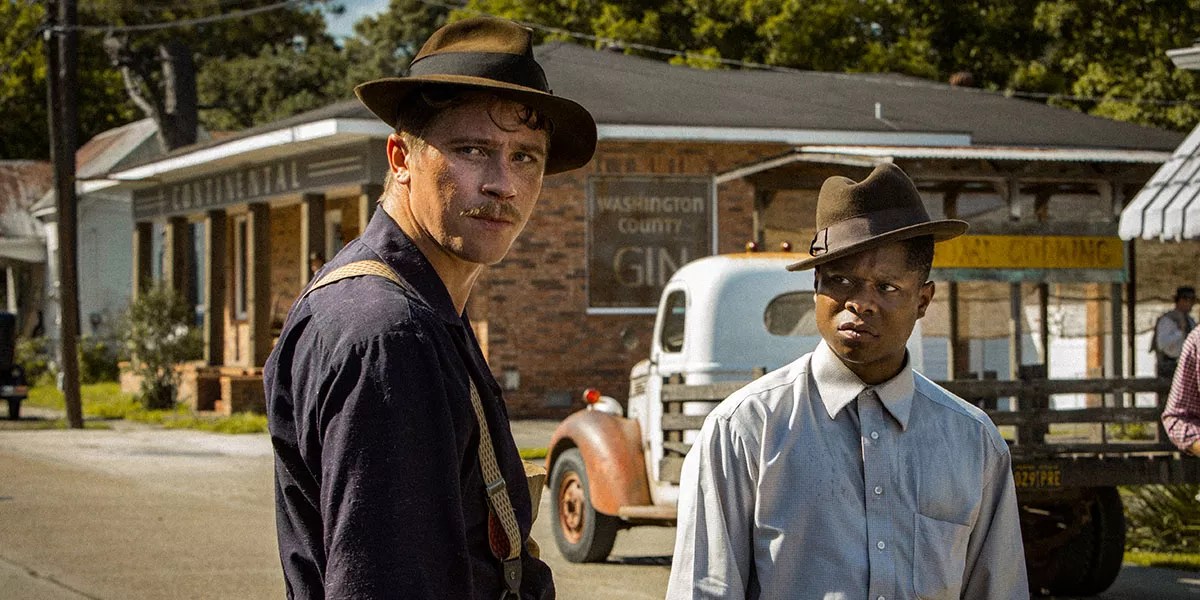
Courtesy Toronto International Film Festival

Audio By Carbonatix
LA Weekly film critic April Wolfe is reporting for us from the Toronto International Film Festival.
Writer-director Dee Rees is breaking all the rules with her third feature, Mudbound. In film school, they tell you, “No voiceovers,” yet this film about two WWII and post-war Mississippi families – one black, one white – is filthy with them. They tell you, “Play it safe until you’re more experienced,” yet Mudbound is a sprawling epic. They say, “Never make a period piece because the budget will be prohibitive,” yet the setting here spans multiple years and continents in the 1940s. With Mudbound, Rees proves the truest rule of all: That talent and vision make all lesser rules negotiable. This absorbing, incredibly accomplished film should win awards and be taught in history classes all over America.
The film opens at the end of this story, with Laura McAllan (Carrie Mulligan) describing what her existence once was like on the Mississippi farm with her husband Henry (Jason Clarke). She leads her two daughters through a brown and barren expanse of land to the makeshift grave Henry and his brother Jamie (Garrett Hedlund) have dug for their father, Pappy (Jonathan Banks). “When I think of the farm,” she says, “I think of mud. … I dreamed in brown.” The story of Mudbound is adapted from Hillary Jordan’s book of the same name, and Rees and her co-writer Virgil Williams adeptly use Jordan’s poetic prose in voiceover, with multiple characters getting their turn to control the story, letting us see the world through their eyes and aches and pains.
After visiting the grave, we go back to the beginning of this story, before the McAllans have even settled on the farm, to the days of the Jackson family eking out a living as cotton sharecroppers. Patriarch Hap (Rob Morgan) and matriarch Florence (Mary J. Blige) send their oldest son Ronsel (Jason Mitchell) off to fight the Nazis, but we sense that they take no pride in his decision. Throughout this story, Rees suggests that this black family has little allegiance to a country that wishes to kill them. But overseas, Ronsel is given the freedom to become a man – a human – though later, back home, he recounts that women in Europe would slap his ass to check to see if he had a monkey’s tail. Still, during his tour, we see him in the embrace of a German woman who happens to be white, and the look on his face is one of great peace, something he will not exhibit back home in Mississippi until he befriends Jamie, also an emotionally wounded veteran of the war.
The friendship that blooms between Ronsel and Jamie isn’t sugarcoated. Jamie doesn’t immediately become Ronsel’s hero, and Ronsel isn’t asking for a white savior anyway. But they both have seen the literal insides of human beings, the blood and guts, and understand their shared humanity. They’re up against some hardcore racists, none more chilling than Banks’ Pappy, but what’s most unnerving isn’t the overt racism depicted in the film but the silence from the “good” white people like Laura and Henry when Pappy spouts his hateful thoughts.
The poverty on the farm is visceral. No matter what stations in life these characters hold, they are painted in mud, and no amount of money can save them from it. It’s almost as though death is clinging to their skin, asking them to succumb. Hollywood has often done a poor job of filming and lighting black skin, but cinematographer Rachel Morrison (Fruitvale Station, Dope, Black Panther) has mastered her craft, so every minute variation of color comes through clearly. The result of her work has the richness and clarity of an oil painting.
Production design is also shrewdly considered. When the McAllans move into their new ramshackle home on the farm, I couldn’t help noticing the peeling paint on the walls, one layer revealing another, revealing another. The paint may be a small detail, but it’s one of great meaning. There’s no removing paint once it’s there. If you sand it away, you inhale the lead, and it’s too much work. Easier to paint over it, to hide it with a nicer-looking coat. But underneath, the poison’s still there. What Mudbound does is peel off all those layers, and it’s painful as hell, but necessary. Dee Rees is clearing the poison away.